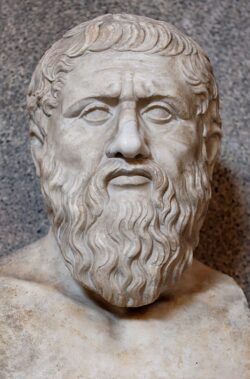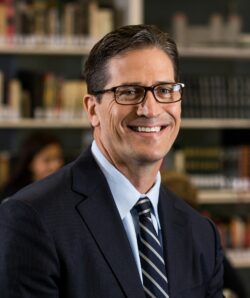The Six Loves: The West
Great Hearts Academies January 4, 2024 -
 At Great Hearts Academies, our kindergarten scholars through seniors study the profound inheritance of Western Culture, its history, philosophy, literature, arts, and mathematical and scientific achievements. And I would argue that the ultimate subject of the story of the West is virtue and human purpose.
At Great Hearts Academies, our kindergarten scholars through seniors study the profound inheritance of Western Culture, its history, philosophy, literature, arts, and mathematical and scientific achievements. And I would argue that the ultimate subject of the story of the West is virtue and human purpose.
We study the West as our American cultural inheritance. By dint of being Americans we are all Westerners, no matter when our ancestors came to this land or where they came from. Furthermore, the Western Tradition is not an ethnic tradition, but an intellectual and moral tradition that all are welcome to embrace. There are other beautiful and great traditions across our globe, but our students must know their own tradition before they compare and study others in depth. Students must also know what is unique about the West. Unfortunately, so many of our American children have been cut off from their own cultural inheritance. In many schools, just facts and skills are taught, or students are given a historical mish mash that leads them more confused than centered.
In contrast, teachers at Great Hearts have a higher calling to pass along a time-tested legacy. The late Louise Cowan from the University of Dallas said it beautifully:
“We teachers are the representatives of a culture… The teacher’s duty is thus to fight off that ever-present darkness by preserving and transmitting the heritage of freedom and virtue that has come to us from the past but is always open to new insights and new communities.”
The Western Tradition is rightly understood to have begun three millennia ago in the Mediterranean basin. We think of the meeting point of three continents—Southern Europe, the Near East, and North Africa—and more importantly a crossroads of cultures and ideas that still define culture today. In terms of capitals, we also think of Athens as the birthplace of Western philosophy and democracy, Jerusalem as the origin of so much of Western moral thought and our understanding of the divine, and Rome as the progenitor of much of the civic and legal structures we still depend on today.
These points of thought and order within the West were just starting points, but the great thinkers, books, and ideas they generated still fuel the great conversation that takes place in our classrooms today: what does it mean to be fully human, wise, just, courageous, and temperate? The West has been called by some the “civilization of the book”, and when we say we love the Western tradition, we are also expressing a preference for the great books of literature, science, mathematics, philosophy, theology, and history that have been written in and about this tradition. As Augustine would say, this great conversation is “ever ancient and ever new” and every 21st century student, from every background, deserves to participate in it and add to its conclusions.
Also, we don’t worship the West. We study it with a clear and critical eye. There is much to criticize and condemn in the actions of our forerunners. The history of the West contains the most tragic and horrible experiences ever known, from slavery to the holocaust. We and our students must soberly encounter this reality and seek to understand the human beings who suffered through it. One cannot be classically educated without encountering the potential of objective virtue and the human capacity for profound vice as well.
Yet the story of the West also includes the rise of democracy, citizenship, individual rights, due process, the Magna Carta, and the Declaration of Independence. The West is the birthplace of abolitionism and the home of the civil rights movement. Despite our failings, the core DNA of the West is one of virtue and freedom, perhaps best expressed in the cardinal virtues, the American founding documents, and our deepest moral and spiritual traditions. Andrew Zwerneman in his book, History: Forgotten and Remembered, describes the difference between a fragmentary history and a history worthy of a liberal arts education. We ask our students and ourselves to find the truest sense of the past, human experience in context, good and evil, and look for the heroic moments too when virtue was lived out under the most difficult of circumstances.
Our students read the writings of the great African American orator and abolitionist Frederick Douglass. I often reflect on his response to the Dred Scott case (1857), one of the worst decisions in Supreme Court history, that continued to make slavery legal. He was crushed with disappointment but still said this:
“I base my sense of the certain overthrow of slavery, in part, upon the nature of the American government, the constitution, the tendencies of the age, and the character of the American people… I know of no soil better adapted to the growth of reform than American soil. I know of no country where the conditions for affecting great changes in the settled order of things, for the development or right ideas of liberty and humanity, are more favorable than here in these United States.”
Likewise, a century later, Martin Luther King in his inspiring “Letter from a Birmingham Jail” (1963), calls for America to live up to its founding documents, and he defends innate human dignity and the right to freedom via the classical thought of Plato, Augustine, and Aquinas.
To conclude, at Great Hearts we study our Western heritage and believe that our cultural inheritance is unique and primary to us as Americans. We believe that in order for students to become culturally literate citizens of the legacy of virtue, they must share certain specific knowledge based in the study of the West. To be sure, this story of the West is still unfolding, and Great Hearts students will be well positioned to write the next chapter.
 This article is part two of a six-part series from The Six Loves of Great Hearts by Dr. Daniel Scoggin, Academies Officer and Co-founder of Great Hearts. You can read Part One of the Six Loves:Virtue.
This article is part two of a six-part series from The Six Loves of Great Hearts by Dr. Daniel Scoggin, Academies Officer and Co-founder of Great Hearts. You can read Part One of the Six Loves:Virtue.
Do you have a story or know of a story that you would like to see featured at Great Hearts? Please contact jmoore@greatheartsamerica.org.